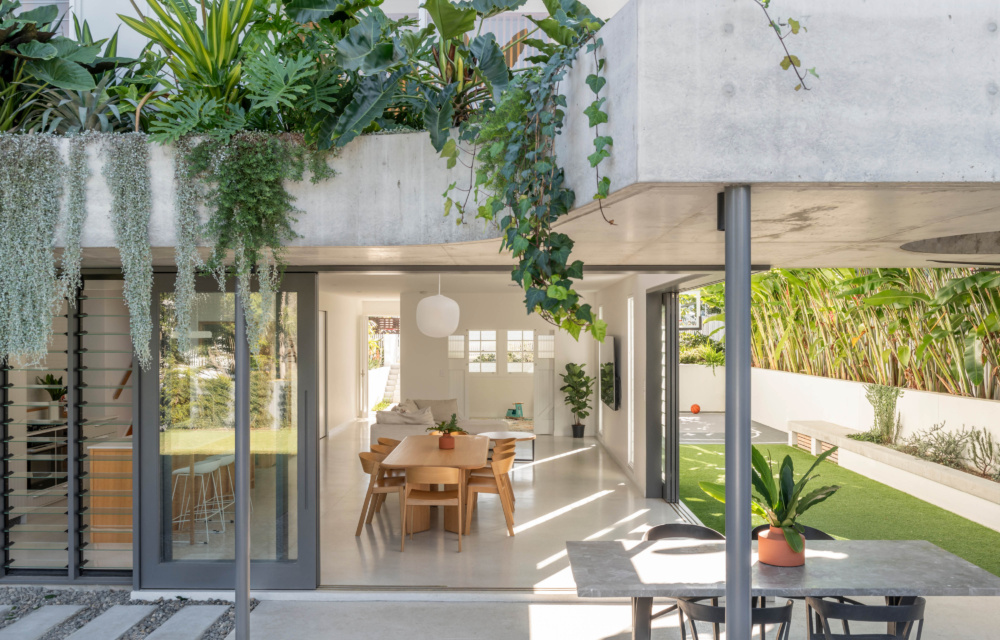A Light-Filled Reinvention Of A 1920s Queenslander
Interiors
Bones Studio have brought light and greenery into this 1920s Brisbane home through a transformative void and reconfigured floorplan.
The view of the dining area, with void above, from the new outdoor dining space.
The new grassed area on the south side of the home, looking to the outdoor dining area on the west.
Bones Studios’ core approach to the renovation was introducing a large void along the southern side of the house (replacing the kitchen), and moving all communal spaces downstairs.
The two storeys are visually connected throughout.
The new kitchen.
A suspended concrete planter bed beside the void adds depth to the light, casting dynamic, dappled shadows throughout the day.
The dining and lounge area before the versatile study/playroom/fifth bedroom.
Newly introduced materials in the project including solid Victorian ash are classic and bright, working to enhance natural light from the new void and skylight.
To align with the home’s new spatial arrangement, the front door was relocated to the ground level, and the original front stairs removed.
Existing wet areas were reconfigured to create a spacious family bathroom and an en suite for the main bedroom.
Terrazzo benchtop slab from Fibonacci.
Tiles by Artedomus.
The renovation has retained original Queenslander features.
These living areas now spill out onto the outdoor spaces, including a basketball hoop to the south, and the outdoor dining area and new pool to the west.
The new ground floor walkway to the front door.
The renovation has had a transformative impact on the clients’ lives.
Faux gables to the facade, added in 2002, were removed to restore the home’s original character.
Before this 1920s Queenslander’s recent transformation, the entrance to the property was on the upper floor, and the interior was dark and enclosed.
In addition, a significant 2002 renovation had marred the home’s original character, introducing two faux traditional gables for an awkward looking facade.
It was Bones Studio’s job to address these issues, while better connecting the home with the outdoors.
The design practice’s core approach was introducing a large void along the southern side of the house (replacing the kitchen), and moving all communal spaces downstairs.
A suspended concrete planter bed beside the void adds depth to the light, casting dynamic, dappled shadows throughout the day.
To align with the home’s new spatial arrangement, the front door was relocated to the ground level, and the original front stairs removed.
Chris Brandon, director of Bones Studio, explains, ‘Previously, the retained front yard at street level blocked northern light from reaching the ground floor.
‘By excavating and terracing the site, we opened up the ground-level entry, allowing natural light to flow into the interior.
‘Additionally, removing one of the faux gables helped restore the front facade to its original Queenslander character.’
Newly introduced materials in the project including solid Victorian ash are classic and bright, working to enhance natural light from the new void and skylight.
‘The new wall linings feature simple flat boards (plasterboard and fibre cemet) to differentiate from the more intricate VJ and weatherboard linings in the original Queenslander,’ says Chris.
The updated floor plan sees all the living spaces on the ground floor, and all bedrooms above (except for a versatile study/playroom/fifth bedroom).
These living areas now spill out onto the outdoor spaces, including a basketball hoop to the south, and the outdoor dining area and new pool to the west.
Lush greenery by Hortum Landscaping is brought into the home through views from the void, high windows above the dining area capturing cascading plants, floor-to-ceiling doors opening to the backyard, and a densely planted ‘lawn’ on the main bedroom balcony.
Chris says the biggest challenge of the project was engineering and detailing the suspended concrete planter bed.
‘Initially, an engineer suggested it was impossible without large concrete blade columns. We sought a second opinion and collaborated with another engineer [Inertia Engineering] to achieve a more elegant structural solution,’ he says.
‘We are most proud that we were able to solve the aspects of a complex brief.’
The previously underutilised backyard is now a central activity space for the family, providing a seamless indoor-outdoor connection that enhances daily living.

